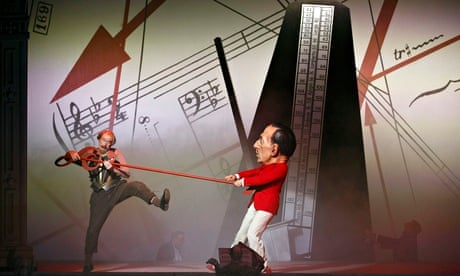"An elderly composer prepares to present a public showing of his latest opera to his friends in his salon," begins the synopsis in Grange Park Opera's programme book. With sets as well as direction by Charles Edwards (Gabrielle Dalton provides the costumes), this staging offers two parallel stories: one a traditional version of Massenet's 1910 musical adaptation of Cervantes' classic novel, played out on a stage within a stage; the other loosely based on the composer's situation towards the end of his life.
To bass Clive Bayley falls the task of presenting both the fictional knight and a composer facing old age and the rise of modernism, personified by Stravinsky; most memorably during the famous episode when Don Quixote tilts at the windmills – here presumably representing newfangled compositional trends.
The Russian iconoclast appears with a giant head, while a large score of The Rite of Spring is paraded before the audience, just in case they don't get the point. (It seems pedantic to point out that Massenet died nine months before the premiere of Stravinsky's ballet.) Meanwhile, baritone Jonathan Alley's bandit-chief Ténébrun bears a striking and presumably not-coincidental likeness to Diaghilev.
Unless you have some sort of qualification in Massenet studies, however, none of these references would matter very much; they certainly matter less than the original scenario, which largely gets lost en route. Despite that, Bayley manages to convey at least some of the nobility and grandeur of Cervantes' courtly creation – though not as much as he could in a staging more concerned with narrative and character. David Stout is a formidable Sancho Panza and Sara Fulgoni a game and rich-toned Dulciné (or in Edwards's rewrite, Massenet's mezzo muse, Lucy Arbell). Renato Balsadonna conducts the BBC Concert Orchestra in a generally decent account of the score.

Comments (…)
Sign in or create your Guardian account to join the discussion